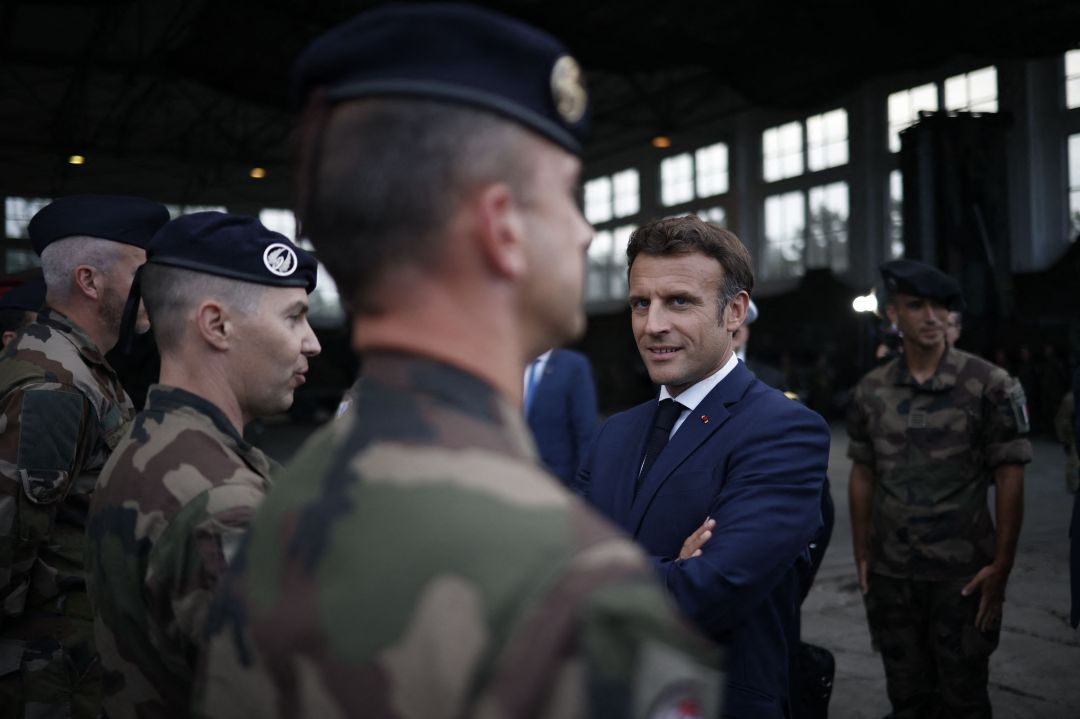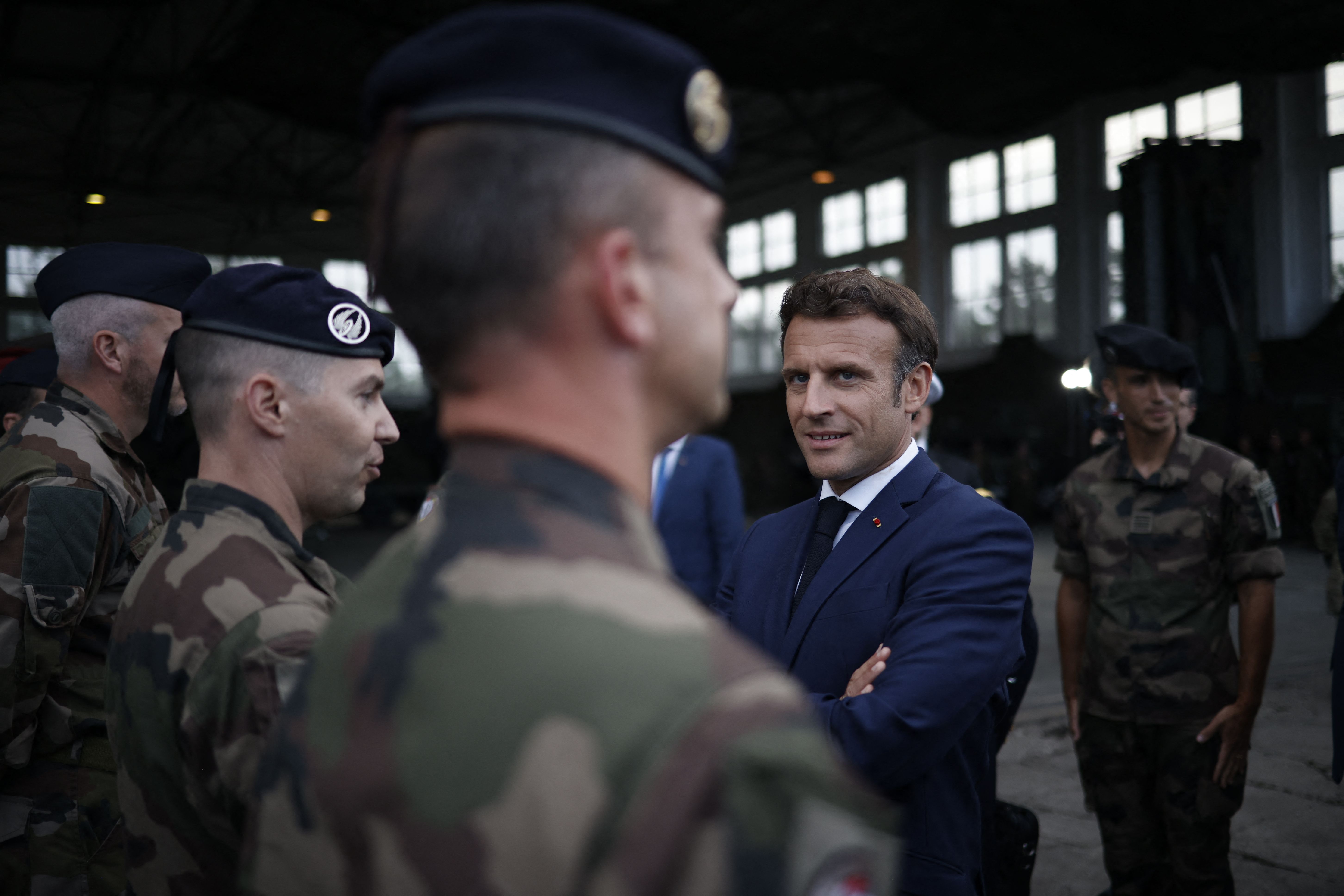Last Sunday I marched through Paris with tens of thousands of disgruntled Frenchmen and women. I was there to observe, not holler and sing like those around me, a mix of Socialists, Communists and Greens. They had much that they wanted to get off their chest: the cost of living, ‘climate inaction’, the war in Ukraine, the state of the health system and their opposition to social security reform.
On Thursday it was the right who marched in Paris, led by Éric Zemmour, on the streets to voice their anger about the horrific murder of a 12-year-old in Paris. They see it as symptomatic of an immigration system they claim is broken.
Throw in a month-long strike by oil refinery workers that has caused huge queues at petrol stations, and the prospect of further industrial action by rail staff and nuclear plant workers, and it’s evident that France is beset by deep social and economic strife.
None of this would unduly worry Emmanuel Macron who, after all, saw off the gilet jaunes movement four years ago, were it not for the fact that his global credibility also appears to be on the slide.
Macron was scheduled to meet Olaf Scholz in Fontainebleau next Wednesday for the annual Franco-German ministerial council, the first since the new German chancellor replaced Angela Merkel, but it has been pushed back to January. It is reported that there are significant and bitter divisions in energy and defence policies.
Macron is said to be particularly aggrieved after Germany unveiled a €200 billion domestic energy support scheme without consulting him. French noses were also put out of joint in March when Scholz announced that it would modernise its airforce with American F-35 combat aircraft rather than developing the European alternative, the SCAF jet-fighter. The latest row is over the European missile defence shield, which has crystallised tensions between the two nations. According to an Élysée spokesman, France is ‘attached to the construction of a strategic autonomy’, and Germany (along with several Eastern European countries) wish to grow within a Nato led by the US.
This contretemps is not a surprise to the French media, which in recent years has been increasingly critical of the lop-sided nature of the Franco-German couple. As one prominent magazine put it last year, for how much longer will France tolerate being ‘fleeced’ by the Germans, whose European policy is predicated on what’s best for Germany?
Nowhere is France’s reduced status in the world more apparent than in Africa
When Macron was elected to office in 2017, he was lauded by globalists still in shock after the victory of Trump and Brexit. They overlooked the fact that here was a man with scant political experience. He was an investment banker before joining François Hollande’s staff in 2012.
Macron is not only politically callow but he has character flaws that have exposed his inexperience, his vanity, his arrogance and his temper. One of his first acts on becoming president in May 2017 was to sack his chief of staff, General Pierre de Villiers, after a row about the defence budget. Macron announced an €850m cut to military finances. When de Villiers vigorously protested he was removed. ‘I am the boss’, the then 39 year-old president told the 60-year-old general.
De Villers’ successor, François Lecointre, resigned unexpectedly last year, reportedly because of disagreements with Macron about his decision to withdraw French troops from Mali, where they had been fighting Islamic insurgents since 2013. One newspaper described Lecointre’s resignation as a ‘bitter departure’, adding: ‘Sometimes, the armed forces and their entourage are exasperated by French diplomats’ lack of creativity and extreme prudence.’
If the military regard the diplomatic corps as light on initiative, Macron’s beef is that they’re too elitist. With that in mind, in April this year he announced that the 800-strong diplomatic corps would be merged into a larger body of senior civil servants. ‘With this reform, we will create a more concentrated, more diversified hub of civil servants,’ said a government spokesman. The diplomat corps went on strike in protest, and 500 of their number wrote to Le Monde, warning: ‘We risk the disappearance of our professional diplomacy… it is the very existence of the ministry that is now being put into question.’
Some diplomats claimed Macron’s move was motivated less by elitism and more by control. Gérard Araud, a former ambassador to the US, suggested the reform would mean that the ‘door is now open to American-style nominations’ – in other words, appointing friends, donors and allies to key diplomatic positions.
The dispute underlines the diplomatic and military tensions that have emerged during Macron’s presidency, and these are reflected in France’s diminished standing in the world.
The French generally approved of Macron’s negotiations with Vladimir Putin in February in a bid to avert a war with Ukraine. It made them feel that the Republic still had clout and wasn’t merely an insignificant member of the US-led Nato; but the talks ended in embarrassing failure and the French didn’t like that.
In a desperate bid to stay relevant, Macron has only revealed his inexperience, vacillating between robust support for Ukraine and mooting more peace talks with Putin. If this has irritated his Nato allies, so has his recent declaration in a TV interview that in the event that Putin used tactical nuclear weapons in Ukraine, France would not respond in kind.
Britain’s Defence Secretary Ben Wallace accused Macron of ‘revealing his hand’, and some of the French media also criticised their president for his lack of ambiguity. In an interview with Le Figaro, Bruno Tertrais, a specialist in nuclear strategy at the Foundation for Strategic Research, compared Macron’s answer with François Mitterrand’s in 1986 when asked how France would respond in the event of a Soviet nuclear attack on West Germany. ‘He refused to answer, saying among other things that it would mean that deterrence had failed, etc,’ explained Tertrais. ‘I think Emmanuel Macron should have said that he refuses to enter this game… without being more precise.’
Nowhere is France’s reduced status in the world more apparent than in Africa where, according to an article this month in Mondafrique by the veteran French reporter Leslie Varenne, ‘the days of the “policeman of Africa” are definitely over.’
Leaving aside Macron’s clumsy dealings with Algeria (last year president Abdelmadjid Tebboune accused his French counterpart of ‘reopening an old conflict in a totally unnecessary way’, it is in sub-Saharan Africa where Macron has stoked the greatest discord.
This year there have been violent anti-French demonstrations in Mali, Niger, Chad and Burkina Faso. The latter were particularly disturbing, involving attacks on the French embassy.
Russia helped foment the trouble in Burkina Faso by enabling Captain Ibrahim Traoré to seize power last month in a coup, and the Wagner Group of mercenaries has been prominent in Africa for a number of years. But Vladimir Putin has been able to gain a foothold in Africa because of strategic mistakes by France stretching back to 2008 when, under the presidency of Nicolas Sarkozy, France began to reduce its military presence in Africa. The next year France re-joined Nato’s military command structure after an absence of 43 years and this decision, says Varenne, has ‘contributed to the degradation of its image on the Continent.’
France then took part in the ill-conceived Nato-led coalition intervention in Libya in 2011, removing Colonel Gaddafi and throwing the region into a chaos that persists 11 years later. As a result, France came to be seen by Africa no longer not as an independent nation, a bridge between the Europe and Africa, but part of the colonialist West.
France’s image has further deteriorated because they have turned a blind eye, or tacitly supported, what Varenne describes as ‘juntas’ in Mali, Chad, Burkina Faso and Guinea. The people in these countries blame France for ‘the support given to presidents who are illegitimate in the eyes of their populations…these practices make the people who aspire to democracy despair.’
Under Macron, France has been a failure in Africa diplomatically and militarily. ‘For many, the French army that arrived in Mali in 2013 was going to solve the problem quickly,’ said Djakaridia Siribié, a journalist for Burkino Faso paper Sidwaya. Instead Macron withdrew his troops, angering not just his military leaders but also sending a message to Africa that France is not the power it once was. So they are looking elsewhere, to Russia, Turkey, China and India, all of whom are expanding their interests in the Continent.
Varenne also claims that Macron’s strategic errors have even left him isolated within the EU, because ‘member states such as Italy, Germany and Spain do not wish to pay for the mistakes of Paris in the Sahel… thus the EU is looking for a way to re-establish good relations with Mali after France’s departure.’
When Macron was re-elected for a second term in April he declared in his victory speech that ‘France must make its voice heard, show the clarity of its choices, and build its strength in all areas. And we will do it.’
Six months later, there is confusion, not clarity; weakness, not strength. Macron’s people are on the street protesting and France’s allies are questioning his reliability.
On hearing of Liz Truss’s resignation on Thursday afternoon, Macron expressed his hope that ‘stability’ could soon return to Britain. France could do with some stable governance of its own.








Comments